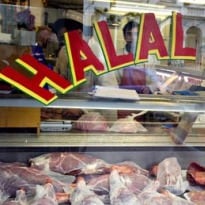The likes of KFC and Tesco are simply meeting demand. But consumers should be told what they are eating
Despite recent reports to the contrary, many fast-food and restaurant chains in Britain have been using halal - in Arabic "permissible" or "lawful" - meat for years. Nearly 100 KFC outlets around the country serve halal-approved chicken, as do around 75 - a fifth - of Nando's. The sandwiches served in selected Subway stores have contained halal meat since 2007, while all Pizza Express chicken is halal. Even McDonald's trialled a halal offering, before deciding the changes required to its kitchen procedures would be too great.
Sainsbury's, Tesco and Morrisons, which sell halal ranges at selected stores, and Boots, which sells halal baby food, serve halal meat firstly because people want it: Britain's Muslim population is growing - 3% of the population in the 2001 census, 5% in 2011, and an estimated 8.2%, or around 5.6 million people, by 2030. As KFC puts it: "Feedback from consumers has indicated that there is significant demand for halal food ... We've chosen [to serve it] in stores in areas where we expect demand for halal restaurants."
For Pizza Express, as for the major food service companies that supply schools, hospitals and airlines, serving halal chicken across the board simplifies the supply chain and minimises the risk of complaints from customers who may unknowingly eat non-halal meat.
There remains, of course, the risk of complaints from customers who unknowingly eat halal meat - which is why restaurants should make clear, as most do in their windows and on their menus and website, what they are serving. (KFC and Nando's both also say they ensure, when opening a new halal restaurant, that there is a non-halal one nearby.)
There is considerable confusion, however, about exactly what halal meat is. Islamic rules require the animal to be slaughtered while alive and healthy, that the appropriate Islamic blessing be recited, and, crucially, that it be killed by a single, quick cut to the throat and its blood allowed to drain out fully.
That sounds bad. But banner headlines about "ritually slaughtered meat" conceal the fact that, according to a 2012 Food Standards Agency report cited by the RSPCA, 97% of cattle, 96% of poultry and 90% of sheep slaughtered using the halal method in UK abattoirs are stunned before being killed - a procedure that makes them insensible to pain and distress.
That, of course, means that up to 10% of British halal meat may come from animals that have not been slaughtered in a way animal welfare experts consider humane: some stricter Muslims insist stunning is not halal, and some halal authentication bodies - of which there are five in the UK alone - deem it an offence against Qur'anic law and tradition. But the halal meat served by KFC, Nando's, Pizza Express and Subway is certified by bodies that do permit pre-stunning. These chains stress that their suppliers are "contractually obliged" to provide only pre-stunned meat, that all EU and UK legislation has been met, and, in the words of KFC, that "none of our welfare standards have been compromised".
People should, of course, know exactly what they are eating. But they should also know that, in terms of animal welfare, the RSPCA makes no distinction between pre-stunned halal meat and conventionally slaughtered meat. It argues only that consumers should have "the right to choose whether or not they wish to buy meat from animals slaughtered without pre-stunning". The headlines do not always make that clear.
Photo: Many restaurants and fast-food chains have been using halal meats for years. Photograph: Alex Segre / Alamy








